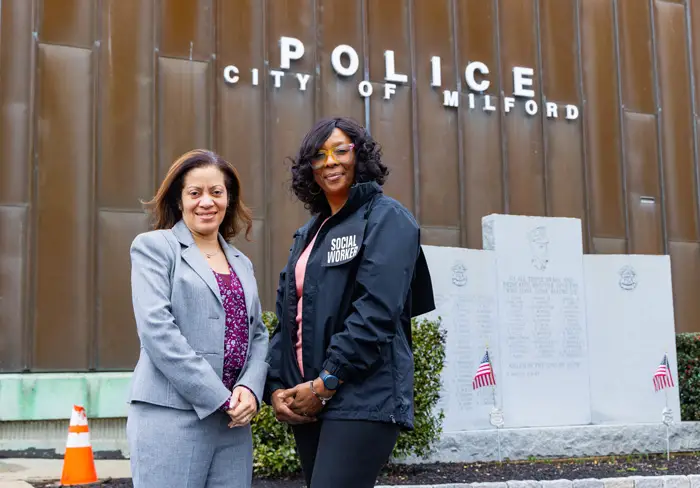
Following the 2020 deaths of George Floyd in Minneapolis and Breonna Taylor in Louisville at the hands of police officers, the Connecticut legislature responded by passing a sweeping law on police accountability. This legislation — Connecticut’s Public Act 20-1 “An Act Concerning Police Accountability” — encourages police to use social workers on calls for assistance, especially after high profile incidents of police brutality.
Dr. Isabel Logan, associate professor of social work at Southern Connecticut State University, saw the bill as an opportunity. In August 2020, together with Willimantic Police Department Lt. Matthew Solak, Logan co-founded the Social Work and Law Enforcement Project (SWLE). The project began as a one-year pilot program that embedded two undergraduate social work interns from Eastern Connecticut State University, where Logan then taught, in police departments. Since then, SWLE has blossomed into a full-time program to include social work professionals as well as undergraduate and graduate social work interns from colleges in five states – Connecticut, New York, Alabama, Kentucky, and Alaska – working with police in five Connecticut cities – Willimantic, Milford, West Hartford, Norwich, and Suffield – as well as in Port Jervis, N.Y.; Florence, Alabama; and Fort Wainwright, Alaska; and the Southern Connecticut State University Police Department.
“I was a social worker for 20 years with the public defender’s office in Connecticut, where my first job was as the New Haven Drug Court Social Worker in 1996. The drug court had an assigned police officer, with whom I worked closely, from the New Haven Police Department. I also worked the GA, JD, and Juvenile Court,” says Logan, whose years of experience as a forensic social worker and research in bilingual professionals and microaggressions in the court system informs her career in academia and research on police social work.
“I have always been interested in the intersection of social work and law,” adds the renowned scholar, who entered academia with the goal of creating a forensic social work program that would reduce recidivism and bridge the disconnect between academia and the workplace in order to meet community needs.
“After George Floyd, I reached out to the Willimantic PD, in the city where I worked, and they were extremely receptive. I needed help placing students, they needed to comply with the state mandate. Lt. Solak from Willimantic and I clicked right away. I couldn’t ask for a better partner and co-founder,” says Logan, who joined the Southern faculty in fall 2023.
The pioneering program for social workers and police departments has become a nationwide model, gaining attention and praise from U.S. Education Secretary Miguel Cardona in 2022, and Logan recently received the 2023 Social Worker of the Year from the National Association of Social Workers’ Connecticut chapter for her contributions to the emerging field of police social work. Logan is also a licensed clinical social worker, a CIT Coordinator, and a Police Certified Instructor in Connecticut.
Logan and the SWLE Project have also led the development of a curriculum for a first-in-the-country Police Social Work Academy, and she receives calls from around the country to share her innovations with law enforcement agencies and schools of social work. The academy prepares the interns who will be placed in law enforcement settings and the police professionals who are preparing to be their task supervisors, as well as train social workers who are starting work in a police social work position.
As part of the SWLE program, interns do ride-alongs with police officers, act on referrals, attend community meetings, and do research and policy work. “Social workers only go on calls that are mental health-related,” says Logan. “We try to be preventative, to get to individuals before they escalate into crisis,” she says, adding, “Safety is our number one priority. No intern is ever alone – or leaves the car until a police officer assesses the situation and clears the scene.”
Logan has created a nationwide network to support interns and police social workers, to link those who are developing this field in multiple states across the country. As part of this work, Logan has presented at two national conferences and is the first to create an integrative police social work practice model, which she published in the Journal of Social Work Education in an article on the preparation of social workers for police social work.
In May 2024, Logan and the SWLE Project hosted the 3rd Annual National Conference on Police Social Work on the Southern campus. The conference was attended by more than 170 individuals from 16 different states.
Tina James, ’18, a graduate of the police social work internship program and a full-time social worker in the Milford Police Department, says that participating in the SWLE Project offered her the opportunity to give back on different levels and deal with different people.
“It doesn’t seem like work to me,” says James. “I have a passion inside me to work with people who are less fortunate than me. In this position it is limitless – I have so much support, and that’s given me the confidence to push myself and be the person that people can count on and be of service. Helping someone – that in itself is enough – it fulfills an inner fire for me. It’s all about purpose.”
Southern has been good for her as well as for SWLE. “I’m so happy to be at Southern and be embraced for my research,” she says. “The Social Work Department here makes sense for the work we’re doing, with graduate programs. We’re doing community action research – practice informed research and research informed practice Ours is the first program in the country to provide education and training for police social work.”



















